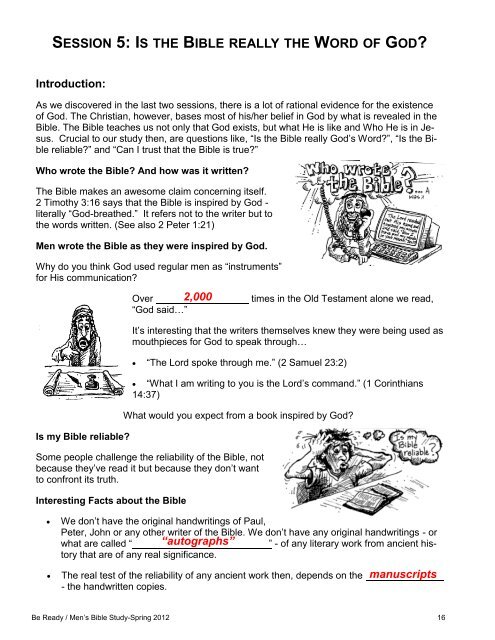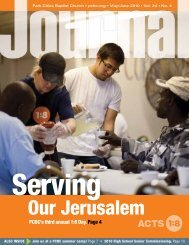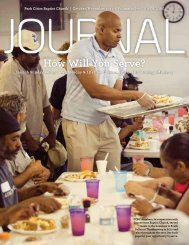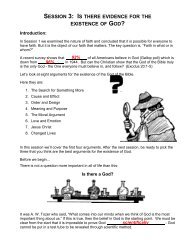SESSION 5: IS THE BIBLE REALLY THE WORD OF GOD?
SESSION 5: IS THE BIBLE REALLY THE WORD OF GOD?
SESSION 5: IS THE BIBLE REALLY THE WORD OF GOD?
Create successful ePaper yourself
Turn your PDF publications into a flip-book with our unique Google optimized e-Paper software.
<strong>SESSION</strong> 5: <strong>IS</strong> <strong>THE</strong> <strong>BIBLE</strong> <strong>REALLY</strong> <strong>THE</strong> <strong>WORD</strong> <strong>OF</strong> <strong>GOD</strong>?<br />
Introduction:<br />
As we discovered in the last two sessions, there is a lot of rational evidence for the existence<br />
of God. The Christian, however, bases most of his/her belief in God by what is revealed in the<br />
Bible. The Bible teaches us not only that God exists, but what He is like and Who He is in Jesus.<br />
Crucial to our study then, are questions like, “Is the Bible really God’s Word?”, “Is the Bible<br />
reliable?” and “Can I trust that the Bible is true?”<br />
Who wrote the Bible? And how was it written?<br />
The Bible makes an awesome claim concerning itself.<br />
2 Timothy 3:16 says that the Bible is inspired by God -<br />
literally “God-breathed.” It refers not to the writer but to<br />
the words written. (See also 2 Peter 1:21)<br />
Men wrote the Bible as they were inspired by God.<br />
Why do you think God used regular men as “instruments”<br />
for His communication?<br />
Is my Bible reliable?<br />
Over<br />
“God said…”<br />
times in the Old Testament alone we read,<br />
It’s interesting that the writers themselves knew they were being used as<br />
mouthpieces for God to speak through…<br />
“The Lord spoke through me.” (2 Samuel 23:2)<br />
“What I am writing to you is the Lord’s command.” (1 Corinthians<br />
14:37)<br />
What would you expect from a book inspired by God?<br />
Some people challenge the reliability of the Bible, not<br />
because they’ve read it but because they don’t want<br />
to confront its truth.<br />
Interesting Facts about the Bible<br />
2,000<br />
<br />
<br />
We don’t have the original handwritings of Paul,<br />
Peter, John or any other writer of the Bible. We don’t have any original handwritings - or<br />
what are called “ “autographs” ” - of any literary work from ancient history<br />
that are of any real significance.<br />
The real test of the reliability of any ancient work then, depends on the<br />
- the handwritten copies.<br />
manuscripts<br />
Be Ready / Men’s Bible Study-Spring 2012 16
The key is manuscripts we have and they were written.<br />
<br />
<br />
how many<br />
The New Testament we read today is based on about<br />
early manuscripts or pieces of manuscripts all written in the orignal<br />
Greek.<br />
The Gallic Wars, written about the same time as the New Testament,<br />
is based on 9 or 10 manuscripts. (It’s interesting that no one<br />
questions the reliability of the Gallic Wars).<br />
50 AD to 90 AD<br />
when<br />
5,500<br />
The New Testament was written from . The<br />
earliest fragment dates about 120 fragments dating within<br />
150-200 years. Compare that again to the Gallic<br />
Wars, written about that time, where the earliest copy dates about<br />
1,000 years after it was written!<br />
<br />
<br />
Another famous work of antiquity is The Iliad by Homer. The first complete copy is dated<br />
about 2,200 years after it was written!<br />
The 5,500 manuscripts were found throughout the known world of the New Testament.<br />
These manuscripts are surprisingly exact in comparison to one another. The minor discrepancies<br />
never alter the meaning of any text. The bulk of these manuscripts agree word<br />
for word with one another!<br />
<br />
Our Bible today is based on these first manuscripts. There has not been a lot of “passing<br />
down through the ages” because we have access to these early manuscripts.<br />
1947<br />
The famous Dead Sea Scrolls, discovered in , proved that the Old Testament<br />
had been passed down correctly through the years by scribes whose job was to copy exactly<br />
from one text to another (most scholars date the Scrolls at about .<br />
The more you dig into the facts concerning the Bible<br />
the more reliable it becomes!<br />
The early church leaders quoted the New Testament<br />
in their writings. Almost every New Testament<br />
book is quoted by Clement, bishop of Rome, who wrote<br />
about 96 AD.<br />
25,000<br />
150 BC—50 BC<br />
More that sites showing some<br />
connection with the Old Testament period have been<br />
located in Bible lands (archaeologists have found the<br />
Bible to be accurate).<br />
<br />
The Bible is full of remarkable prophecies that have been fulfilled. Countless prophecies<br />
are fulfilled in Jesus – His birth, life and death. (Micah 5:2, Isaiah 52:13-53:12, Luke 24:25-<br />
27)
Jesus Himself quoted Scripture as final authority (Matthew 26:54, 56).<br />
For Discussion and Application<br />
Let’s go back to Anselm of Canterbury (from Session Two) which is more true?:<br />
I must understand in order to believe.<br />
I must believe in order to understand.<br />
Don’t forget that the Bible is a spiritual book and the Holy Spirit speaks through Scripture to your<br />
heart. We cannot rely on reason alone.<br />
1. Did you believe the Bible was inspired before you became a Christian? Did you think it was<br />
reliable? Explain:<br />
2. Look at 2 Timothy 3:16 again. What does it mean to you that the Bible is “God-breathed”?<br />
3. What would you expect from someone who is convinced that the Bible is truly the Word of<br />
God? Does your engagement with Scripture reveal your high regard of Scripture?<br />
Pray for God’s Word to be central in your life. Pray for those you’re seeking to reach for<br />
Christ.<br />
Be Ready / Men’s Bible Study-Spring 2012 18
















